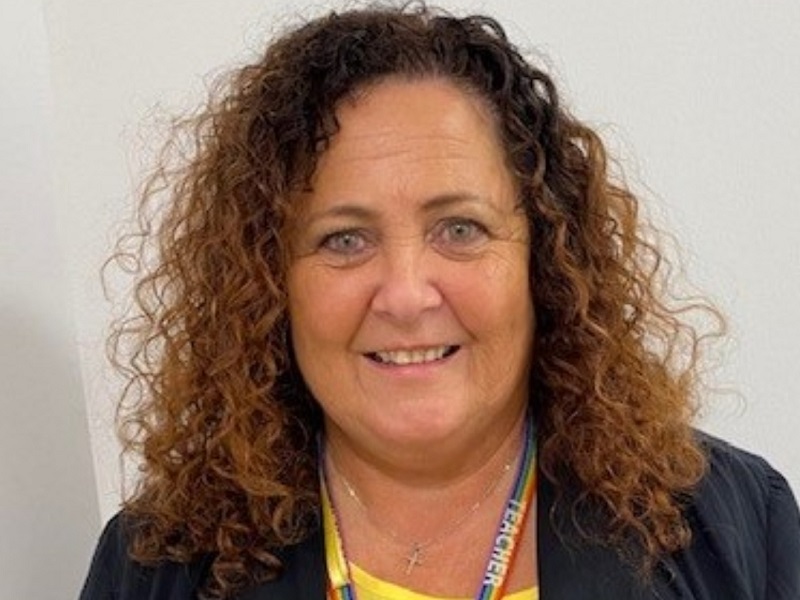
I am privileged to work with students from diverse backgrounds and with a team who seek to promote the positive inclusion of all students, including those who are members of the LGBTQ+ community.
Young people who identify as LGBTQ+ or are questioning, often come to our setting on the back of negative experiences in mainstream schools. Their sense of belonging has very often been compromised and self-esteem is low. We all have a need to have that sense of belonging and this is even more pertinent for adolescents who are trying to navigate their way in the world and find their identity.
With this in mind, and in working towards a whole school approach to positive inclusion, we began working towards the Rainbow Flag Award in 2021 and we have now been awarded the accreditation.
The Rainbow Flag is a quality assurance framework that looks at six areas and encourages a whole school approach to LGBTQ inclusion and supports schools in developing strategies to challenge and combat LGBTQ phobic bullying.
Excel & Exceed have passed all six and below is a summary of what was demonstrated for each category:
- Skilled Teacher – We have demonstrated that staff, senior leaders and non-teaching staff are able to recognise and consistently challenge and report LGBTQ phobia and that they confidently use positive and appropriate language around LGBTQ identities.
- Supportive Governors & Parents – Governors and parents show and are understanding of the needs to combat LGBTQ phobia through positive education and representation and know where to go for support and information if needed.
- Effective Policies – Policies are in place to address LGBTQ phobia and positively support whole school LGBTQ inclusion.
- Inclusive Curriculum – LGBTQ people and identities have been positively represented across all areas of the curriculum. This includes lessons and activities that are LGBTQ inclusive as well as those that are LGBTQ specific.
- Pastoral Support – LGBTQ pupils wishing to explore or express their gender and/or sexuality are given the support they need. Skilled staff from within the school are able to support through signposting and referrals to appropriate local services.
- Student Voice – Student led initiatives are valued and support to create an LGBTQ inclusive and positive environment.
The whole team received training with a view to better support students. Amongst other things we adapted policies and looked at ways in which we could ensure our curriculum was inclusive and reflective of LGBTQ+ students. Our curriculum ensures that LGBTQ+ people are represented in a positive way across all areas of the curriculum with positive role models that are relatable. We ensure we can learn from each other and respect each other’s differences.
Our schools have done a lot of work around training for use of pronouns. We know that if we mis-gender students and use the wrong pronouns it has a detrimental effect on student wellbeing and we have supported students to put together training that has been delivered to staff CAMHS-wide. This has led to a greater understanding and has allowed people to challenge their unconscious bias.
School climate and culture has a key role in improving the outcomes for LGBTQ+ students and I am proud to say that having a whole school culture which not only celebrates but promotes diversity has made our school a richer place to be. I believe that all students benefit cognitively, socially and emotionally when they interact with those from different orientations. I have every confidence that school staff challenge any incidents of discrimination, homophobic or transphobic behaviour and I am proud that our approach supports staff and students to improve their understanding of LGBTQ+ inclusion.
Our schools are doing well in promoting LGBTQ+ positive inclusion, and for me the next step is looking at this through the lens of intersectionality.
I think it is really important to recognise that LBTGQ+ students are not a homogenous group and that they each have their unique lived experiences and cultural aspects that will shape their identity. We need to be mindful not to make generalisations and to consider how experiences are different for each person. For example a white gay male student may have very different experiences to that of a black gay male student and this may again be very different to the experiences of a black gay female. Supporting staff in considering their own positionality and privilege is vital when seeking to understand the issues faced by our students and supporting them accordingly.
We have a small window of opportunity with our students but have such a great chance to help build their resilience, to develop a sense of self and belonging and to empower them to be able to be ‘who they are’ and to feel safe in their identify. We can help give them the skills that will support a successful reintegration to the community when they are discharged from our care. What an honour it is to be part of their journey.